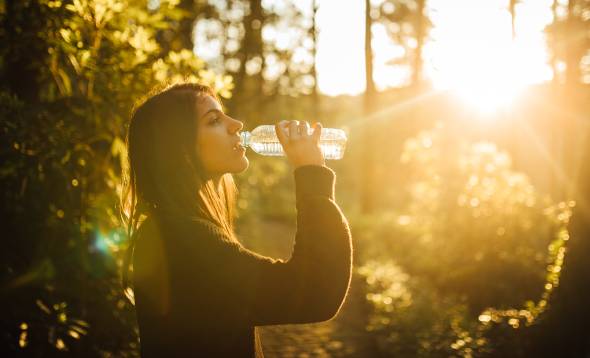That organic living is a conscious health choice
Hydration and Health
Vital for maintaining vital bodily functions, staying well hydrated can also help you lose weight, maintain skin elasticity and sustain immunity.
We tend to forget that water makes up more about 60 per cent of our body weight. It is essential to the functioning of every aspect of our bodies and is just as important to our health as the other aspects of nutrition we tend to pay much more attention to. Water is utilized in maintaining body temperature, lubricating joints and even eliminating waste. Poor hydration weakens the immune system and can cause illness and premature aging.
Water loss occurs when your body performs the simplest of tasks including respiration, perspiration and urination. You experience even greater water loss when you exercise, have a fever, suffer from diarrhea and vomiting, and even when the weather is exceptionally warm. You can tell you or a member of your family is suffering from dehydration based upon a combination of the following symptoms: fatigue (children will be unusually lethargic), headaches, constipation, dizziness, thirst, dry and sticky mouth, and decreased urination (as a rule of thumb, this means that an infant does not wet his or her diapers in three hours). It is considered a medical emergency if the individual suffers from: extreme thirst, irritability and confusion, fever, darker than normal urine, low blood pressure, sunken eyes, shriveled and dry skin, and delirium. In these situations, seek medical assistance immediately.
However, dehydration is often difficult to recognize and it’s best to prevent dehydration by consuming plenty of fluids and including foods high in water (such as fruits and vegetables) in your regular diet. Men should aim to consume 3 liters (about 13 cups) of fluids a day, while women should aim for 2.2 liters (about 9 cups). Ensure that you get your daily intake of fluids by keeping water within reach at all times. If plain water isn’t appealing, add a slice of lemon or lime to it. Keep yourself to a water-drinking schedule if you have trouble remembering to drink water. For example, start and end every day with a glass of water, and have water with every meal; or take a small glass of water every hour. It’s also important that you choose to eat foods high in water content. Watermelons and tomatoes, for example, are 90 per cent or more water by weight. Milk and juices are also good sources of water. In addition to your regular daily water intake, drink some water before you start exercising, and continue to hydrate during and after your workout. Drink more water, too, if you’re in a hot and humid environment.
Dehydration treatments vary depending on the cause of the condition. To treat dehydration in children, you can use an oral rehydration solution that will help replenish both fluids and electrolytes (plain water will not provide essential electrolytes). And if you’re breast-feeding your infant, continue to do so while your baby is sick but offer the rehydration solution as well. Exercise-related dehydration should be treated with cool water and sports drinks containing electrolytes. In cases of severe dehydration, however, it is best to seek the help of medical professionals.
Furthermore, drinking water can help you control calorie intake. By substituting high-calorie drinks with water or non-caloric beverages and pairing them with healthier, more filling water-rich foods, you can trim down your calorie intake and contribute to weight-loss. Adequate hydration also helps keep your skin looking good. In addition, using moisturizer helps to create a physical barrier that retains moisture in your skin. By simply making the effort to ensure that you stay properly hydrated at all times, you can make a dramatic difference to both your internal and external wellbeing.


























_1672804154.jpg)

_1611290459.jpg)